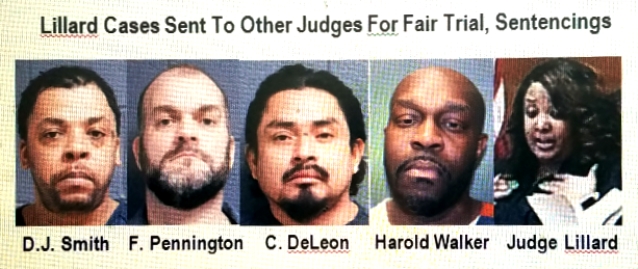
(Video above is from Michigan Supreme Court website: arguments on Harold Walker application for leave to appeal Jan. 24, 2019)
High court voids conviction and sentence, orders that Walker be re-tried in front of another judge
Cites jury “coercion” and intimidation, Lillard calling Walker a “clown” six times during sentencing to 3 to 75 years
In three other cases, Courts of Appeal reversed sentences, cited Lillard’s practice of sentencing defendants to highest level if they exercised Sixth Amendment right to jury trial instead of taking a plea deal
New discovery: Lillard ignored advice from Office of General Counsel to grant Charles Lewis “due process,” hold open court hearing on allegations that Lewis forged order from Judge Drain dismissing conviction; hearing on Lewis case Fri. July 19
By Diane Bukowski
July 17, 2019
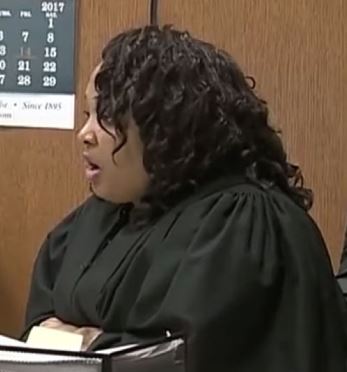
Judge Lillard during DUI sentencing.
DETROIT, MI – A news video in which Third Judicial Circuit Court Judge Qiana Lillard called white family members of a DUI defendant “clowns” for allegedly laughing in court went viral last year, making her a hero. Lillard sent the mother of the defendant to jail for one day.
One website said Lillard, who is Black, was standing up to “white supremacists.” Others expressed admiration for her alleged “no-nonsense” control of her courtroom. See https://www.clickondetroit.com/news/video-judge-throws-woman-out-of-court-during-deadly-dui-sentencing.
But on July 11, the Michigan Supreme Court thoroughly castigated Judge Lillard regarding a 2014 case where she repeatedly called defendant Harold Lamont Walker, who is Black, a “clown” and a “coward” before sentencing him to three to 75 years for firearms offenses. They also cited what they called coercive jury instructions and intimidation of jury members, including forcing one member who was late to sit in the “prisoner’s box” for the duration of the one-day trial.
The high court threw out Walker’s conviction and sentence and ordered him re-tried before another judge. Walker was represented by Attorney Adrienne Young of the State Appellate Defender’s Office, who declined comment on the victory but referred VOD to the court ruling itself. See full ruling at: http://voiceofdetroit.net/wp-ontent/uploads/People-V-Walker-MSC-7-11-19.pdf.

Michigan Supreme Court Justice Megan Cavanagh
“We hold that the [jury] instruction crossed the line from appropriately encouraging deliberation and candid consideration to impermissibly coercing jurors to surrender their honestly held beliefs for the sake of reaching a verdict,” Justice Megan Cavanagh wrote for the 5-2 majority.
“The error was plain, affected defendant’s substantial rights, and affected the fairness, integrity, and public reputation of the judicial proceeding . . . . Additionally, in light of the trial court’s conduct during defendant’s sentencing, we direct that defendant be retried before a different judge.”
The court said further, “After defendant indicated at least eight times during his allocution that he had nothing further to say, the trial judge continued to bait him, engaging in name-calling (calling him a “clown” six times and a “coward”), with the exchange escalating to defendant stating, “F— you,” to which the trial court replied, “Oh, you wish you could.” The trial court also admonished defendant, suggesting that he liked being in prison (“Cause that’s what your life shows me, that you like to go to prison.”) and stated that it would have sentenced him more leniently but for his disrespect toward the court (“I was inclined to give you the middle of the road, . . . but because you’re so disrespectful and you just seem to want to go back to prison . . . .”).
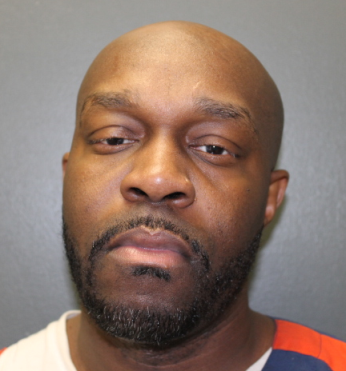
Harold Lamont Walker (Photo: MDOC)
Walker was charged with carrying a concealed weapon, felon in possession of a firearm, and felony firearms. He had been standing with friends, drinking beers, near a house when police cruised by. They claimed they saw Walker move away to a bush near the porch of the house and drop a heavy object from his pocket into the bush. Police said they found a revolver in the bush.
A friend who was with him testified at trial that he had put the gun in the bush earlier in the day. He said Walker had thrown a can of beer into the bush because he was on parole and was not supposed to be drinking.
The court said the judge humiliated a juror who came in 15 minutes late by forcing the juror to sit in the box where in-custody prisoners are usually placed when awaiting their hearings. After the trial ended and the case went to the jury, they sent a note asking to see the weapon and shortly afterwards said they were deadlocked. The court said the judge gave improper and coercive jury instructions as follows:
“Now, if there’s someone among you who’s failing to follow the instructions or there’s someone who’s refusing to participate in the process, you can send us a note and let us know that and we can address that, but at this point I’m not inclined to end your deliberations at this point because you had a full day of testimony and you’ve only been at this, discussing it, for one hour.
“So I’m going to send you to lunch, maybe sometime [sic] apart will help you all to think about things, and then you’ll come back in one hour and resume your deliberations. If you have any questions, if there is anything that you don’t understand or need clarification on send a note. And again, if there’s one among you or two among you, three among you who are refusing to follow the instructions or participate in the process you can let us know that, too.”

Appeals Court Judge Elizabeth Gleicher
The court noted, “The jury returned a verdict of guilty on all counts at 3:07 p.m., approximately 1½ hours after returning from lunch. The trial court sentenced defendant as a fourth-offense habitual offender, MCL 769.12, to concurrent prison terms of 46 months to 75 years for felon-in-possession and CCW, both of which were to be served consecutively to the mandatory 10-year sentence for third-offense felony-firearm.
It said it appeared clear that the jury returned a “guilty” verdict in Walker’s case because it was intimidated by Judge Lillard.
The court also cited Judge Lillard’s depiction of the testimony of Walker’s witness, noting that there was no evidentiary basis for Judge Lillard’s opinion.
“I think he conspired with Mr. Williams, while Mr. Williams was in custody in the Wayne County Jail awaiting trial, and they trumped up that phony, bogus testimony. I don’t think it’s a coincidence that low-and-behold after that young man spent some time in the Wayne County Jail, all of a sudden he decided he wanted to come to court and tell a ridiculous version of events. And I think that that was nothing more than a conspiracy between Mr. Walker and — using his influence over a young man from the neighborhood, who looked up to him, to try to get him to take the rap for him.”
It included an earlier dissenting Appeals Court opinion from Judge Elizabeth Gleicher, in which she included a shocking section of the actual sentencing transcript. See http://voiceofdetroit.net/wp-content/uploads/COA-H-L-WALKER-dissenting-1.pdf.

SADO Attorney Adrienne Young (Facebook)
In three earlier cases, state Courts of Appeals sent defendants to another judge for re-sentencing. They were the cases of Christobal DeLeon, Derek James Smith, and Floyd Pennington. The Courts of Appeals cited Lillard’s admitted practice of handing out sentences at the top of the guidelines if defendants had exercised their Sixth Amendment right to jury trials, rather than taking plea deals.
During oral arguments on the Walker case, Attorney Adrienne Young called the practice “the Pennington practice.” She had included an amendment to her Supreme Court brief regarding that case in particular.
The Courts of Appeals struck down the sentences handed out to those defendants, and ordered that they be re-sentenced in front of other judges.

Trump with “Great Wall of Mexico.”
In the case of Christobal DeLeon, Appeals Court Judge Amy Krause also cited the “severity of the trial court’s misconduct in discussing the race, ethnicity, sexuality or religious beliefs of a defendant while passing sentence.” Judge Lillard had told the Latino defendant, “You, sir, are a discredit to every immigrant who comes to this country seeking a better life . . . .fodder for the people who believe that a wall should be built to keep Mexicans out.”
Krause explained, “The trial court’s comments about defendant’s Hispanic heritage are horrific, as confirmed in part by the prosecutor in their brief, who acknowledges that the trial court’s comments were ‘inflammatory’ and ‘unnecessary.’ Moreover, these statements are meant to echo deeply disturbing rhetoric that paints Hispanic immigrants as rapists, murderers, and thieves. There can be no doubt that the trial court had exactly such characterizations in mind by stating, “[i]t’s people like you and your friends who did what they did to this woman is the reason right now we have a president and a whole bunch of people following him believing a wall should be built to keep Latinos out of this country.” The inclusion of such statements on the record leaves me with no choice but to assume that they were influential in the trial court’s decision.”
One long-time defense attorney told VOD recently that Lillard is known for the abnormally high sentences she hands out.
COURT COUNSEL: LILLARD DENIED CHARLES LEWIS DUE PROCESS IN HANDLING GERSHWIN DRAIN ORDER DISMISSING HIS CONVICTION
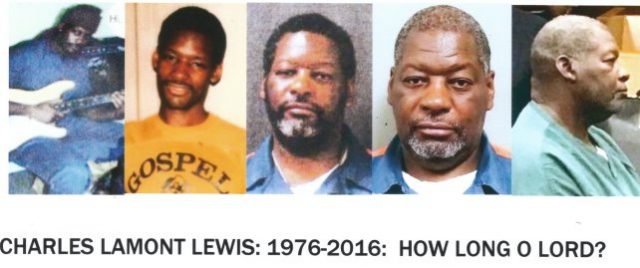
During three and one-half years of juvenile life re-sentencing hearings, which VOD has covered, Charles Lewis brought to Judge Lillard’s attention an Order dismissing his case dated April 3, 2000, signed by Judge Gershwin Drain. The Order (below) was belatedly discovered by an employee in the Court Clerk’s office, misfiled in another case. It was then sent to various other personnel including Lewis’ Residential Unit Manager at Lakeland Correctional Facility, who gave it to Lewis.
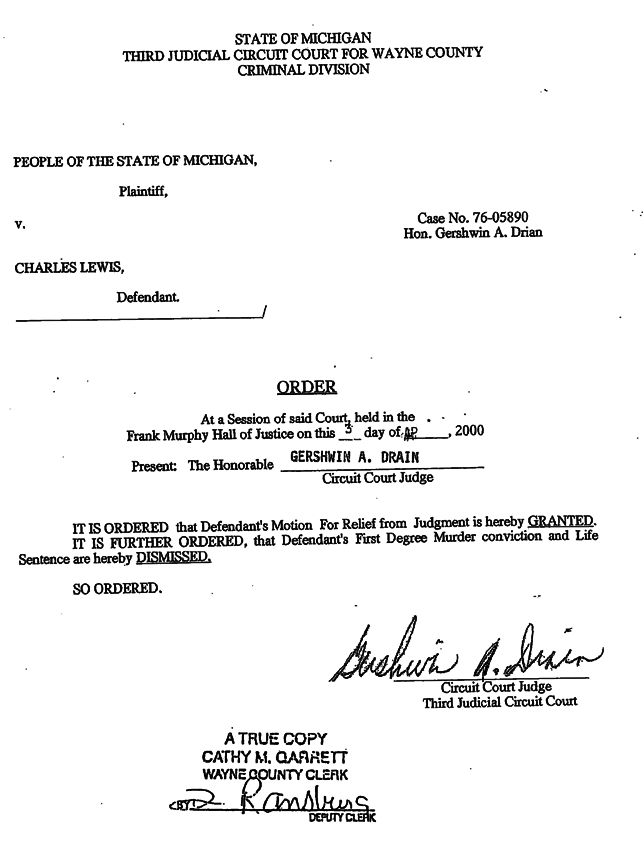
The Order is listed currently at the beginning of Lewis Register of Actions (below at top). An earlier version of the Register of Actions listed it as a dismissal (below at bottom).
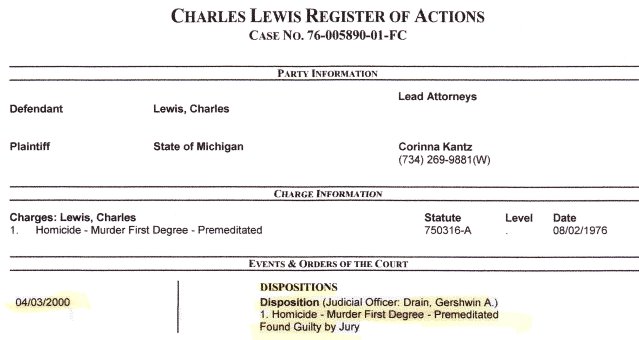

Lillard accepted the copy of the order into the record, but later obtained a letter from U.S. District Court Judge Gershwin Drain dated in 2012 claiming the order was forged and that Lewis had never been on his docket. The letter was not signed by Drain, but instead rubber-stamped.

AP Thomas Dawson and AP Jason Williams share a laugh during one of Lewis’ hearings.
Assistant Prosecutor Thomas Dawson has cited the alleged forgery as evidence of Lewis’ continuing criminal conduct in prison, in his effort to have Lewis re-sentenced to LWOP.
Lewis earlier explained at length, in his Motion to Remand the Correct the Record, how he obtained the document. See full motion under Related Documents below.
But Judge Lillard apparently consulted the Office of the General Counsel about how to handle the order. Atty Valerie Albright responded in 2014 (see full letter at http://voiceofdetroit.net/wp-content/uploads/CLewis-OGC-advice-on-Drain-order.pdf
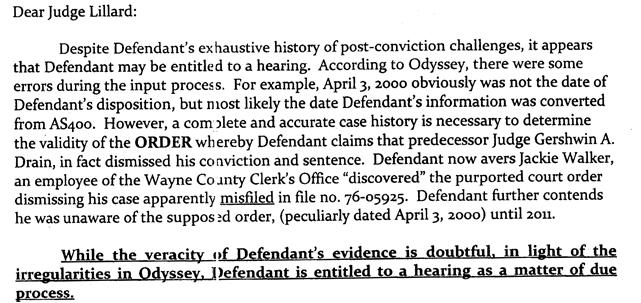
Beginning of Atty. Valerie Albright’s advice to Judge Lillard on Drain order.

U.S. District Court Judge Gershwin Drain
Instead of holding an evidentiary hearing on this most serious matter, Judge Lillard addressed it verbally, stating she had called now-U.S. District Court Judge Gershwin Drain regarding the order, and he denied authoring it or ever having Lewis on his docket. The phone call constituted an ex parte action in violation of proper court procedure.
Additionally, Lillard previously worked in the Wayne County Prosecutor’s Office with Judge Drain’s daughter Shelley Drain, constituting a conflict of interest.Lillard has said in a published article that she considers Wayne Co. Prosecutor Kym Worthy her “mentor.” Chief Judge Timothy Kenny recused Lillard from the case involving the murder of Renisha McBride by Theodore Wafer at the request of defense attorneys, who cited her close relationship with members of the Prosecutor’s Office, including one AP working the case.

Defense Attorney Michael Deutsch with Rasmea Odeh
Drain and everyone associated with the discovery of the order should have been called to testify on the record as Albright advised, but that never happened.
Drain is the judge who ordered Palestinian community activist Rasmea Odeh deported to Israel because she stated on her application for citizenship that she had never been arrested. She was detained, tortured and raped by Israeli soldiers many years ago.
WHAT ACTIONS SHOULD BE TAKEN AGAINST JUDGE QIANA LILLARD FOR HER CONDUCT IN ALL THE MATTERS LISTED ABOVE, AS SHE CONTEMPLATES WHETHER TO RE-SENTENCE LEWIS TO LWOP?
Related documents:
Charles Lewis Motion to Remand the Correct the Record at http://voiceofdetroit.net/wp-content/uploads/CLewis-motion-ro-remand-to-correct-the-record-1.pdf
Court of Appeals dissenting opinion in Harold Lamont Walker case, pending Michigan Supreme Court decision http://voiceofdetroit.net/wp-content/uploads/COA-H-L-WALKER-dissenting.pdf
Court of Appeals opinion castigating Judge Lillard for racial anti-immigrant comments in Christobal DeLeon case: http://voiceofdetroit.net/wp-content/uploads/Lillard-People-v-DeLeon-2.pdf
Court of Appeals opinion in Floyd Pennington case: http://voiceofdetroit.net/wp-content/uploads/People-of-Michigan-COA-Floyd-Ray-Pennington.pdf
Court of Appeals opinion in Derek James Smith case: http://voiceofdetroit.net/wp-content/uploads/Lillard-People-v-Smith.pdf
Related stories:
CHARLES. K.K. LEWIS: JUDGE ORDERS FINAL JLWOP HEARING(S) DESPITE LOST COURT FILE, INNOCENCE CLAIM
WHY IS JUVENILE LIFER CHARLES LEWIS STILL IN PRISON, 16 YRS. AFTER HIS CASE WAS DISMISSED?




